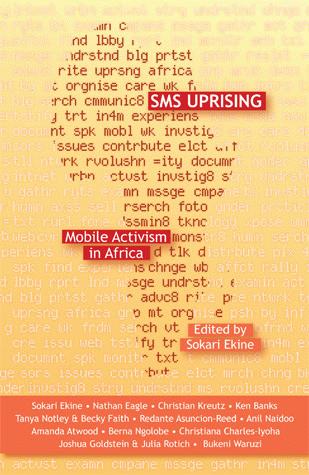SMS Uprising: Mobile Activism in Africa, edited by Nigerian activist Sokari Ekine, is a collection of essays and case studies involving the use of text messaging to promote social change in Africa. Topics include using cell phones as a means of sharing news and avoiding government propaganda in Zimbabwe and collecting information on children’s rights violations in the Democratic Republic of the Congo; other cases address health communication or alerts about political unrest. Ushahidi in Kenya is also discussed. (Ushahidi is an open-source software that collects and maps SMS data in times of crisis. It was also used by Tufts University to help identify victims and distribute aid in the aftermath of the earthquake in Haiti.)
Sokari Ekine points out that the book is unique “in giving an insight into how activists and social change advocates are addressing Africa’s many challenges from within, and how they are using mobile telephone technology to facilitate these changes...The intention is that the information contained within the book will lead to greater reflection about the real potential and limitations of mobile technology.” In one of the chapters, Anil Naidoo writes that SMS “might at best be used as a complement to social organizing rather than as the central part.”
I’d be interested in reading SMS Uprising, particularly considering the popularity of mobile phones in Africa. While this book seems to illustrate some of what we discussed last class, it also adds another perspective, as the course readings seem to address the use of wireless communication in other regions.
Castells explains that one of the limitations of mobile technology is that “the relative autonomy of the content and process of communication does not necessarily lead to social change” (209). But SMS can facilitate social gatherings and protests as “flash mobilizations” arise from rapid information sharing. Mobility, spontaneity, person-to-person contact, and multi-modality are key aspects of mobile technology that facilitate social activism. The person-to-person nature of SMS lends a sense of trust and credibility. These protests can sometimes yield concrete results, such as the ousting of President Estrada in the Phillipines in 2004. Another example of how mobile activism can affect political outcomes is the case of Korean President Moo-Hyun, voted into office in 2002.
We also discussed in class how the use of mobile technology in activist movements must be seen in the broader context of the movement, including the effects of other communication forms that may be present. Castells illustrates that “wireless communication does not replace but adds to, and even changes, the media ecology, expanding the information networks available to individuals and social groups to emphasize the interpersonal level and to enhance the efficacy of autonomous communication oriented toward political change” (213). Yet he cautions against technological determinism, reminding us that mobile technology does not necessarily result in political activism, and political activism can occur without the use of text messaging.
References:
Castells, Manuel et al. “The Mobile Civil Society,” in Mobile Communication and Society: A Global Perspective, 185-213. MIT Press, 2007.

We read that in order for mobile technology, especially SMS, to be truly successful in relation to social movements, one of the most important factors is that one must be receiving information from a friend or someone that they know to give the text legitimacy. So I wonder if some of the SMS that are being used in this case, especially for health and political alerts, are simply from a listserv or if they are truly viral texts that are sent among a network of people who really know each other. This book does seem very interesting as another analysis of how social movement can be successful with the use of mobile technology.
ReplyDelete